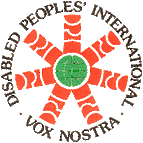Disabled Peoples' International - Europe
Doing research
together:Different ways to identify human potentials and needs
Topics of the conference
What can medicine offer? Where are the research priorities? How are they defined? What do disabled people expect from medicine?
What does it mean to be disabled? Is it a status? An identity? Who defines disability? What can Social Science and Disability Studies offer in order to answer these questions? What do disabled people expect from theses studies?
There are different ways to look on dementia. The predominant way is the one shaped by medicine. As a result it seems to be more important to prevent Alzheimer than to find ways of supporting those living with Alzheimer: as a person with dementia, as a relative or as a caregiver. What would be the consequences using a different perspective?
Depending on the wishes of the participants the range of subject can be either broadened or reshaped. There will be information on funding on the European level in the 7th EU framework.
“Nursery workshop”
The workshop will serve as a research project “nursery” focusing on the identification of research topics and possible cooperation between
Organisations of Civil Society especially disability and patient organisations, their families and caregivers
and
Researchers from different disciplines (medicine, social science, disability studies).
The innovative approach is to look on the potentials of people than on their deficits and at the same time taking into account the needs of people with reduced abilities, with dementia or other physical or psychological limitations, their relatives and their caregivers.
The idea is to foster different European projects where people from different backgrounds put together their different expertises and perspectives: as an academic, as a disabled person, as relatives or as caregivers of persons with dementia, with a disability. The aim is to combine different approaches and methods.
Participants are asked beforehand to develop ideas for research projects. We plan to enhance a discussion on these questions using the website of STACS http://www.citizens.science.org.
The Workshop “Doing research together – different ways to identify human potential and needs”, is part of a project in the frame of the 6th EU-framework, Specific programme “Structuring the ERA, Work Programme Science and Society” (FP6-2005-Science-and-Society-19-044597). The main purpose of STACS (Science technologies and civil society -Civil Society Organisations, actors in the European system of research and innovation) is to provide opportunities for scientists and civil society organisation to design and do common research projects that are relevant for society. This workshop is one of different workshops organised in the project.
It is in relation to the workshop Understanding biomedicine-listening to people with a disability on the 1st of February on the same venue but can be attended independently.
The conference will be in English and French and bilingual participants will make the conference understandable for all participants.
Programme
9.30 Registration
10.00 Welcoming
·
Jean-Luc Simon, DPI Europe
·
Katrin Grüber, IMEW: Conclusions of the Workshop of the previous day “Understanding Biomedicine- Listening to disabled people” and The programs of the 7th EU framework program
10.30 The topics of the workshop
·
Myriam Winance in collaboration with Jean-François Ravaudet Paris Disability studies: a role model for participatory research
·
N.N.: How to provide an egalitarian atmosphere between researchers and patient organisations
·
Ursula Naue, Vienna Governing dementia
·
Javier Romañach Cabrero, Madrid: Expectations from the perspective of disabled person
12.00 Discussion
13.00 Lunch
14.30 Parallel session
"Being disabled: what medicine can and should offer" with Bertrand Tondu, N.N. and Jean-Luc Simon
and Javier Romañach Cabrero
Dementia with Ursula Naue and N.N. Alzheimer Society, UK
16.00 Coffee break
Being disabled: what disability studies can offer Myria Winance, Jean-François Ravaud
16.30 Conclusions of the workshop – how to implement the cooperation between researchers and NGOs.
Closing remarks
Jean-Luc Simon, dpi
Katrin Grüber, IMEW
17.30 End of the workshop
